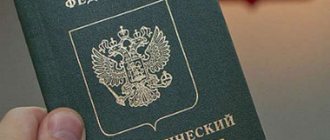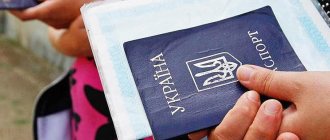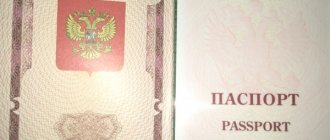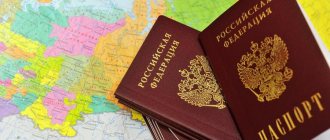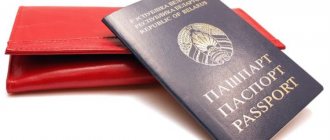Options for moving to Russia for permanent residence:
| Options | Explanations |
| Taking part in the resettlement program for compatriots | People born in the USSR who at one time left for permanent residence in another state |
| Obtaining temporary asylum | suitable for Ukrainians |
| Obtaining refugee status | for persons subject to personal persecution by the authorities of their country |
| Obtaining citizenship using a simplified form | suitable for relatives of Russian citizens and Russian-speaking foreigners |
| Obtaining a residence permit | which gives equal rights and social guarantees to Russians, while remaining a citizen in their homeland |
| Obtaining citizenship | according to the general form after 5 years of residence in the country |
What is permanent residence in Russia
The answer to the question of what permanent residence in Russia means is quite simple - it is a special document that is issued to an IG (foreign citizen) and confirms his right to permanent residence in the territory of our country. Officially, it is called a residence permit (RP), but in everyday life it continues to be called by the familiar abbreviation permanent residence. With its help, IS has the right to move throughout the country and travel beyond its borders. It is also used as an identification paper, instead of an IS passport, but only by stateless people. Compared to citizenship, it has some disadvantages, but the existing rights are sufficient for comfortable living in the country.
State program for the resettlement of compatriots
This is the simplest option. To resettle compatriots back within the framework of the program, they must prove their Russian roots. In this case, the applicant must speak Russian. To participate, you must fill out a form and collect documents confirming your right to move to Russia.
Such documents may be:
- birth certificate;
- a document confirming the need to relocate to another country;
- a will from a relative who is a citizen of the Russian Federation.
Simplified form of acquiring Russian citizenship
In accordance with Article 14 “On Citizenship of the Russian Federation,” the consideration of applications for citizenship on the grounds listed in the article takes three months.
To do this you need:
– that one of the spouses is a citizen of the Russian Federation;
– graduate from an educational institution before July 1, 2002;
– have a child on the territory of the Russian Federation, born there or permanently residing there;
– be a citizen of the former USSR;
– have one or both parents citizens of the Russian Federation;
– have disabled relatives, including children of Russian citizens;
– be registered in any subject of the Russian Federation.
Obtaining a residence permit
After receiving a temporary residence permit (one year), it is possible to obtain a residence permit (residence permit) . It is issued for 5 years and can be subsequently extended. The applicant must prepare a package of documents and submit it to the migration service. Having received a residence permit, which is a form of the established form, a foreign citizen is annually obliged to notify the migration authorities of his residence on the territory of the Russian Federation. If a foreign citizen is absent from Russia for more than 6 months, this will lead to automatic cancellation of the document. If he has a residence permit, he still remains a citizen of his country, and at the same time has the same rights and social guarantees as Russians.
Options for moving to permanent residence
Let's begin to understand the algorithm by listing the list of persons who have the right to move to our country for permanent residence:
- former citizens of the USSR born on the territory of the RSFSR;
- children (under 18 years of age) of parents who have received or are receiving a residence permit (RP);
- parents of people who have received a residence permit;
- incompetent persons receiving a residence permit at the same time as their caregivers, guardians or adoptive parents;
- incompetent persons whose adoptive parents, guardians or trustees have already received a residence permit;
- IGs who are native speakers of Russian (confirmation required);
- illegally deported from the Crimean Autonomous Soviet Socialist Republic and their immediate relatives (relative in a direct ascending line, adoptive parent or spouse);
- highly qualified specialists who work in the Russian Federation and members of their families;
- specialists of a number of professions who have worked in the Russian Federation for more than 6 months;
- graduates of universities with state accreditation who have received an education document with honors;
- former citizens of the Russian Federation;
- people who live in Russia, but their Russian citizenship has been terminated;
- citizens of the Republic of Belarus (Republic of Belarus);
- people who have political asylum in the Russian Federation;
- some other categories.
Obtaining citizenship in the general manner
5 years after living in Russia with a residence permit, a foreign citizen can apply for citizenship . For refugees and migrants who have received political asylum status, this period is reduced to 4 years. Military personnel after 3 years of service in the ranks of the Russian Armed Forces can obtain citizenship.
Absence from the territory of the Russian Federation is allowed for no more than 3 months per year, or the calendar year will not be counted.
To obtain a Russian passport, the applicant needs to know the Russian language well, have a stable source of income and renounce previous citizenship.
“When you go to Russia for permanent residence, know what awaits you there...”
Hundreds and thousands of stories related to this seemingly simple process, which has been going on for more than two decades, have apparently reached the authorities of this country. Here they are finally talking about a new migration policy. But when will these yet-to-be-released laws come into effect and will they make the situation easier for our compatriots?
At the start - everything is simple
Here is just one of these many thousands of stories of people who decided to leave the former Soviet republics and move to the Russian Federation. We won’t talk about the reasons, but the main one is still quite clear - the call of the blood, the desire to live in the country of your ancestors and native language.
Having made this decision, the Zaripovs were relieved to learn that since they were born in Russia, they had some advantages. The procedure for completing all procedures and statuses is the same for everyone, but the time between successive receipt of the main statuses - temporary residence permit, residence permit and acquisition of citizenship - is significantly reduced.
Who discredited healthcare? 02.04.2021 13:306350
“There was one more plus at the start. After hanging around in queues at the Russian Consulate in Almaty for a month and a half (this was in January 2014), we submitted our documents. And six months later, having moved to St. Petersburg, we received a temporary residence permit, which saved us several months of waiting. This was the first stage of the journey to a Russian passport,” says Svetlana Zaripova.
Bureaucracy in action
Then everything was much more painful. The queues at the regional FMS office were simply fantastic. It was necessary to occupy them late in the evening or early in the morning, sign up with some vague individuals who were on duty at the doors of the regional migration service, weeks or a month in advance, report daily, and then, when the deadline arrived, stand for several hours in the offices to hand over the documents . Those who stood in line for a long time in cramped corridors exchanged experiences, shared information and their emotions about the difficulties of moving.
“During this time, I have never seen that anyone was lucky enough to pass the documents on the first try. Although a list of all the necessary certificates and questionnaires could be found on the website or service stands, it was impossible to fill them out correctly. What nuances were not cleared up when submitting all these papers! – recalls Svetlana. “At the reception, the inspector made a lot of comments and amendments, especially in the application. Having corrected everything, the next time (and because of the long queues it could only come in a month or two) you went to another inspector and he made new comments, demanded additional certificates, which the previous employee did not mention on your first visit. This is just incredible horror!
One of the unexpected requirements, for example, is the translation into Russian of the text of the passport of a citizen of Kazakhstan, birth certificates, diplomas of graduation from a Russian-language school, and stamps in documents. And this despite the fact that the second page of the Kazakh passport is filled out in Russian, as other documents and stamps on them are translated. But the translation had to be done and certified by a notary.
Tashkent is a efficient city 04/02/2021 07:004867
I was struck by the high ranks of FMS employees who performed fairly simple duties of accepting documents. Majors, lieutenant colonels, colonels... The state, of course, knows best, but what costs does it incur where everything could be made more transparent, simpler, more accessible and cheaper.
A little later, all district services of St. Petersburg and the Leningrad region were united into one migration center. There it was especially clearly visible how many people had come for permanent residence to the northern capital of five million and the region of almost two million and were eager to receive a Russian passport.
Only two hundred people were accepted per day, but there were many more who wanted to get a ticket to see the inspector. People stood on the street for several hours to be the first to enter after the opening. The building is of impressive size, there are separate halls and even benches for those waiting for seemingly good changes. But in the offices everything remained the same. In addition to the endless alterations of documents and certificates, the many-day waits for the next visits, the attitude of the officials was depressing, indifferent, rude, to whom they seemed to say the notorious: “Here we come in large numbers!”
“In 2015, we finally submitted our documents and six months later received a residence permit. The wait for citizenship was supposed to take another year, but it lasted much longer due to the same queues and bureaucratic ordeals in offices. One year, I note, is the official period for those born in Russia. Those Russians who were born in other republics of the former Soviet Union need to wait five years!” says Svetlana Zakirova.
Absurdity and shadow business
Black shadows of green energy 03/30/2021 07:004089
The Zakirovs calculated that they spent more than three years on the entire process from the beginning of applying to the Russian Consulate in Almaty to receiving a passport with registration! And all this time they did not even try to look for work - firstly, they had to deal with all the stages of obtaining citizenship, and secondly, without citizenship it is problematic to find a job. The employer needs to obtain special permission to hire you, and this is troublesome. We are not talking about employing a whole team of builders from another republic, for example, but about just one person.
“During this time, we have aged another three years and now, even though we have a passport, we are not very much in demand on the labor market due to our age,” Svetlana saddens.
Now she understands why obtaining citizenship for young people takes many years - they need to work, it’s difficult to endlessly ask for time off to visit the migration service. That’s why some people don’t have a passport even after ten years of living in Russia, while others are forced to turn to the shadow side of acquiring a red-skinned book.
“The clandestine acquisition of citizenship for a lot of money in Russia is quite developed, as evidenced by frequent reports on major TV channels. But we, as law-abiding citizens, did not take this path, and we were sure that our homeland would cordially open its arms to our compatriots,” says Svetlana and finally briefly tells the story of her son.
The son, who studied in St. Petersburg, began the procedure for obtaining Russian citizenship later than his parents, since this is not so important for a student. He was registered under the status of “native speaker of Russian”. And what? He, who graduated from a Russian-language school in Almaty, which is confirmed by a certificate in Russian, and was a final year student at St. Petersburg University, was required to take an exam in the Russian language! The special commission that took this exam from him to obtain a certificate of knowledge of the Russian language did not really hide the fact that this was a simple formality. But the long queues to go through this procedure as well, a big waste of time, were quite real!
What will change?
A few months ago, the President of the Russian Federation issued a decree on state migration policy until 2025. It says that over the past five years, more than a million people have received Russian citizenship. It is recognized that in this way the migration flow compensated for the natural population decline and became a source of additional labor resources for the economy.
The demographic situation in the country is not great. Experts have calculated that without migration growth the population will be 137 million people by 2035, and with it - 157 (currently 147 million).
Now Russia plans to receive 5-10 million people in the next 5 years, and this seems almost fantastic. Of course, if, as in some countries, citizenship was granted almost from the moment a person stepped off the plane, then such a fairy tale could be made true. But this is unlikely for various reasons, the main one of which is not to make the country a passageway for crime.
Relaxations and simplifications, however, are planned; after the Decree, new laws should be adopted. It is expected that simpler and clearer rules will be established, free of administrative barriers. Apparently, the realization is finally coming that the world is now competing not for natural raw materials or technologies, but, above all, for people.
***
© ZONAkz, 2021 Reproduction is prohibited. Only a hyperlink to the material is allowed.
